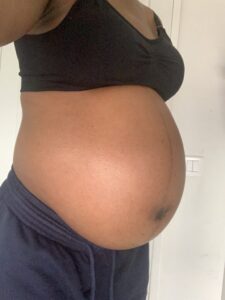 |
| Photo courtesy of Sora Shimazaki |
I was ten when my breasts started to develop. I remember feeling ashamed when the small bumps became noticeable underneath my school uniform. During that time, I used to play with the kids in the neighborhood after school, staging wrestling and pillow fights and organizing football and running matches. As my shape changed, I became self-conscious and stopped playing with the neighborhood kids, who were mostly boys. I began wearing loose-fitting shirts and isolating myself indoors after school.
I wasn’t happy when I had to give up my colorful training bras for adult ones. At my all-girls school, my sense of shame was profound, as I developed breasts earlier than everyone else. I felt embarrassed every time one of my classmates jokingly undid my bra. It happened a lot to those of us who started wearing hooked bras early.
I was mortified when my first period came and stained my light blue school uniform. I remember wishing it had started at home so that everyone didn’t have to know that I had begun menstruating. I was ashamed as I walked home with a cardigan tied around my waist. I felt as though people could tell that I had a blood spot on my bum. My mother, who was very ill at that time, couldn’t give me the “talk” as she had done with my older sister. I didn’t want to bother her with my problems as I thought it could wait. No one had told me that cancer had spread in her body and that she was dying. When she finally found out that I had begun menstruating, I remember she burst into tears. “My daughter is now a woman,” she had said. I remember feeling embarrassed that I had become a woman. I didn’t feel like one and wasn’t in any way eager to become one.
As I got older, my period cramps got worse and I would begin getting migraines a few days before my period. It got to a point where the pain got so bad that I could barely function. I’d skip classes at the university if the cramps started during the day or would miss an entire day if it started overnight. I was always ashamed when I had to explain my absence to my male lecturers. I always felt that they didn’t believe me and thought that I was exaggerating its severity.
A few years later, when I couldn’t get pregnant after my husband and I decided to start our family, I suffered stigma and shame. While my friends were having their second and third children, I was still struggling to have my first. I wanted just one but I couldn’t conceive. I was heartbroken every 24 days when my period showed up unfailingly. I struggled with depression when friends I started fertility prayers with all got pregnant and I had to continue praying for a miracle baby on my own. I felt like God didn’t answer my prayers because he didn’t love me.
Over the years, fertility treatments caused my fibroids to grow and I was burdened with heavy flow and embarrassing leakages in public. The fibroids made my stomach so bloated that people thought I was expecting a baby. I was embarrassed every time someone offered me special treatment in public because they thought I was pregnant. When my fertility doctor suggested a myomectomy (the surgical removal of fibroids) to increase my chances of getting pregnant, I didn’t hesitate. A pound of mass removed, I left the hospital feeling much lighter, physically and emotionally.
When I finally got pregnant two years later, I became so sick that I was unable to function; I was nauseous all the time. The vomiting remained severe and unrelenting despite taking the anti-sickness drugs the doctor prescribed. I felt a crushing sensation of shame every time I threw up all over the floor and my husband had to clean after me. I was so exhausted that I couldn’t make my own meals or help with the chores. As nauseous weeks turned to nauseous months, I worried that my boss would think I was exaggerating. I didn’t understand why my body made me so weak and so sick. How would me being so terribly sick help my baby?
I was devastated when a second trimester ultrasound scan revealed that my daughter was not healthy and that her condition was fatal. I had multiple blood tests, fetal echocardiograms, obstetrical ultrasounds, and an amniocentesis. It was in shame that I always walked along the hospital halls, past women who were pregnant with healthy babies. I felt as though everyone could tell that my daughter was unhealthy. I was completely heartbroken when my prayers did not reverse or stabilize her condition and I was angry when the specialists suggested a termination while we were still awaiting the results of the genetic testing we had undergone.
As the days passed, my daughter moved less and my health began to deteriorate. I suffered fatigue, shortness of breath, tachycardia, polyhydramnios, uterine contractions and edema in my legs, ankles, and feet. It was with shame that I finally agreed to have my pregnancy terminated. In defeat, I accepted that the pregnancy was non-viable and that my daughter would not survive outside the womb because her lungs were underdeveloped.
 |
| The author at 27 weeks |
I was terrified when I learnt about how the procedure would be done. My daughter’s heartbeat was still strong when the doctor put both of us to sleep and then stopped her heart. I hated myself as I felt like an accomplice to murder during the two days it took to induce labor. While everyone else in the maternity ward was pushing out live babies, I was at the back, pushing out a stillborn child.
It was again with shame that I accepted the postpartum hemorrhage that began immediately after the birth of my daughter. I thought I was going to die and I was certain I deserved to die. I felt that I was not worthy to be a mother and that it must be the reason why God took her away from me. I couldn’t stop feeling responsible for being the reason why my husband was mourning instead of rejoicing. It was still in shame that I left the hospital with my husband with an empty belly and empty hands while other couples were able to leave with their healthy babies. I felt like I was paying for a sin I had committed. It was with shame that I left the WhatsApp prayer group I had joined for pregnant women.
I dreaded going to bed the first night back home because my daughter would not be sleeping in a bedside crib right next to me. I remember randomly breaking down in tears many times during the day. I blamed myself for not being capable of carrying my baby to term. I was disappointed that the doctors didn’t do enough to save her. I was angry that God did nothing. As I slipped into depression, I’d stay in bed until noon. Nothing held my interest. My life didn’t seem worth living.
I was ashamed every time someone who had seen me with a large belly asked me how the baby was doing. I would whisper my response because it felt like something that I should be ashamed to announce; I had gotten wrong what all other women were getting right. I see them sincerely shocked and saddened to hear about my loss that I find myself having to apologize for traumatizing them with such bad news. Some are at a loss for words to console me and struggle to find the right words to comfort me. Others, in their attempt to encourage me, say that I am still young and should try again. Other women tell me of their experiences and I realize that miscarriage and feticide are not so uncommon.
I am constantly reminded of my body’s failure as women who got pregnant around the same time I conceived are welcoming their babies. I feel guilty for not being capable of producing a healthy baby. The doctor told me that my daughter’s condition was rare, that it happens once in every one thousand births. After many years of waiting to conceive, it’s hard to believe that I ended up a statistic.
It was a tough pregnancy and I have no nice bump pictures. Sometimes it feels like this period didn’t happen, that it was a bad dream I had or a tragic fiction novel I had planned to write. Sometimes it feels so real that I feel like the pain will never go away. Sometimes, I struggle with shame, other times, with guilt, regret and hopelessness. I blame my body for always betraying me, for always bringing me shame and for always causing me pain. The cause of my daughter’s condition remains of unknown etiology yet I feel that somehow my body was responsible.
Today my husband and I have become an intentional child-free couple. He, because he was traumatized by the whole experience and almost lost me to postpartum hemorrhage. Me, because I have failed woefully at starting a family and I am too afraid and too traumatized to try again.
Because I know that I am not childless by choice, I will continue to suffer shame in silence. I hope that someday I will forgive my body, make peace with it and accept its shortcomings.
First published June 6, 2021 on AYO